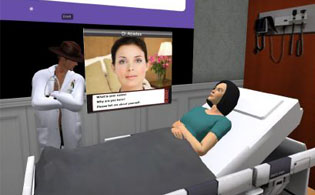Message from Centre for Information Technology in Education within the Faculty of Education
CITE Seminar Series 2014/2015
CITE Seminar – Teaching in the Virtual Environment at HKU
Time: 12:45 pm – 2:00 pm
Venue: Room 104, 1/F., Runme Shaw Building, The University of Hong Kong
Speaker: Brant Knutzen, Lecturer, Faculty of Education, University of Hong Kong
 About the Seminar
About the Seminar
Are you ready to teach in the virtual world? This seminar will introduce the use of the Second Life virtual environment for teaching at HKU. Current projects will be reviewed and demonstrated, including training for medical students on HKU Medicine Island and a range of teaching environments constructed on HKU Education Island, such as a 1-1 laptop virtual classroom, an art deco bar / restaurant, a small theatre, and two designed to train psychomotor skills in the virtual world: arachnophobia, and a tesseract.
The Fire Safety scenario constructed for the Pathology dept at HKU is designed to be experiential learning for Histopathology lab students, to supplement their normal PPT safety briefing. Students use a Head-Up-Display (HUD) to receive instructions, and make choices. After going through the scenario the individual participants will join small-group online discussions using Participation Forums on Moodle to talk about what went wrong, and why. Video demonstration: https://www.youtube.com/watch?v=b6yXVR96sYc
Later we plan to develop Chemical Safety, and Biological Safety scenarios.
The Biochemistry scenario is designed to supplement face-to-face laboratory training for medical students, make it more interesting and engaging, and provide a patient background to the analysis of a bio-sample. Students will participate in teams, and each team will be assigned one of five virtual patients, each unique case history with disease symptoms and bio-sample for analysis. Teams will present their diagnoses to the class.
In part 1 the student doctors meet the patient, reviews her medical history, and views a recorded telemedicine interview based on chatbot technology. Video at: https://www.youtube.com/watch?v=yoM1X2dG9xw
In part 2 the students takes the patient bio-sample from the hospital to the laboratory for lipoprotein separation analysis. Students use a Head-Up-Display (HUD) to receive instructions, and make choices regarding common problems setting up the gel tank electrophoresis equipment, and the basics of analyzing the results.
Video at: https://www.youtube.com/watch?v=9Z0IrDeOAmY
Teaching in the virtual world is ideal for blended and distance education, and implementing a “Global Classroom”.
After the demonstration, an open discussion will follow about resources available, ways to integrate the use of the virtual environment into teaching, and a Virtual Environment Study Group for interested people to join.
About the Speaker
 Brant Knutzen has been developing innovative educational resources using technology since 1985, when he set up a BBS to coordinate and train PC support technicians for Hughes Aircraft company in Los Angeles. More recently, he built his first virtual world in Second Life for an international school in 2008, to support a Design course. Since 2009 he has been teaching for HKU on the MSc IT in Education programme as a lecturer.
Brant Knutzen has been developing innovative educational resources using technology since 1985, when he set up a BBS to coordinate and train PC support technicians for Hughes Aircraft company in Los Angeles. More recently, he built his first virtual world in Second Life for an international school in 2008, to support a Design course. Since 2009 he has been teaching for HKU on the MSc IT in Education programme as a lecturer.
Now in 2014, he has created scenario-based experiential learning on HKU Medicine Island to support TDG studies for Biochemistry and Pathology students. These engaging scenarios are integrated with Moodle learning activities to support formative assessment, including customized discussion forums for small-group social construction of knowledge (see ParticipationForum.org for more info). Another tool he has created to quantify group participation and display qualitative patterns of interaction is the Participation Map, a learning analytic Moodle plugin (see ParticipationMap.org for more info).
Both of these customized Moodle tools were tested in pilot programs at HKU in 2012, and installed on the central HKU Moodle server in 2013 to support online discussions and social constructivism pedagogy. A new addition to the Participation suite of tools is the Participation Glossary, which automatically awards a point whenever a student contributes a new term definition.
For more information, see blog at Brant.Knutzen.se
Please register at
http://www.cite.hku.hk/news.php?id=526&category=seminar

